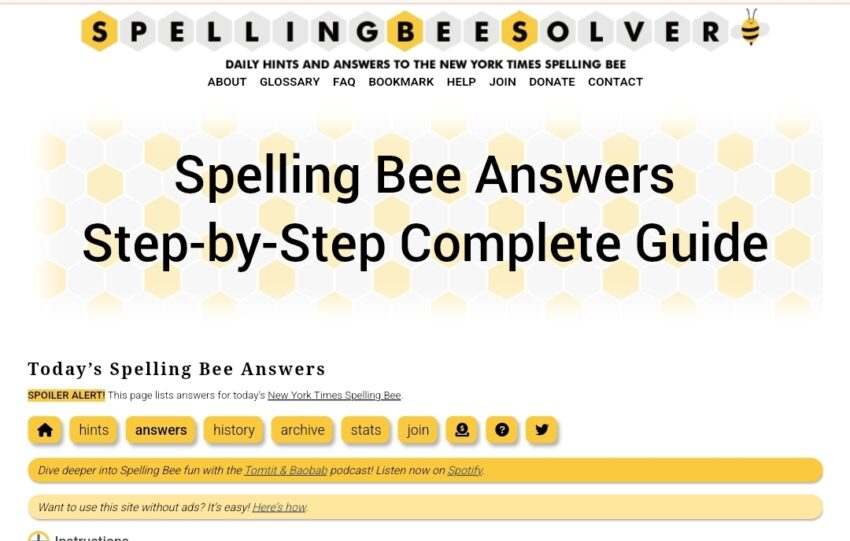Ever wondered how those brilliant contestants on stage in a spelling bee seem to spell words you’ve never even heard of? If you’ve ever been curious about how they do it and how spelling bee answers play into their success, you’re in the right place. In this article, we’re going to break down everything you need to know about spelling bees—from how answers are determined to tips on preparing for one yourself. Ready to dive into the world of tricky words and nail-biting competitions? Let’s get started!
What Is a Spelling Bee?
A spelling bee is a competition where contestants are asked to spell a wide range of words, often with varying levels of difficulty. These competitions can take place at schools, regionally, or even on a national level. The goal is simple—correctly spell words to stay in the game. Mess up, and you’re out. The last person standing wins!
Why Spelling Bees Are Important
Spelling bees are more than just a fun academic activity. They help improve vocabulary, boost memory, and enhance problem-solving skills. They also instill a sense of discipline and focus, qualities that benefit participants in all areas of life.
Common Challenges in Spelling Bees
While spelling bees may sound straightforward, they come with their fair share of challenges. Here are some of the most common hurdles participants face:
Difficulty of Words
Some words in a spelling bee are so obscure that even seasoned readers may never have encountered them. This can make the competition both intimidating and exhilarating.
Pronunciation Variations
Contestants often struggle with word pronunciation. Depending on regional accents or the specific dialect of the person pronouncing the word, hearing and interpreting the word correctly can be tricky.
How Spelling Bee Answers Are Determined
Spelling bee answers are not randomly chosen but are meticulously selected based on several factors such as word difficulty, etymology, and the rules of the specific competition. Contestants can ask for the word’s origin, definition, and sentence usage, which helps them make an educated guess when they’re unfamiliar with the word.
Tips for Preparing for a Spelling Bee
So, how do you become one of those spelling geniuses? Here are some tips to prepare:
Practice with Word Lists
Most spelling bees have a set of word lists for contestants to practice with. Regular drilling of these lists can sharpen your memory and boost your chances of success.
Learn Root Words and Etymology
Understanding the root of a word helps you break it down. For example, knowing that “phobia” comes from the Greek word for fear will help you spell words like “arachnophobia.”
Focus on Pronunciation and Usage
Asking for the pronunciation and a sentence helps you understand the context of the word. This can often provide subtle hints about the spelling.
Spelling Bee Answers: How They Help Contestants
Spelling bee answers are the cornerstone of a contestant’s strategy. Answers provide not only the correct spelling but also valuable insight into patterns and word roots. Many contestants practice by going over past spelling bee answers to familiarize themselves with the types of words they might encounter.
Different Types of Spelling Bees
Did you know there are various types of spelling bees? Let’s break them down:
Classroom and School Bees
These are smaller-scale competitions that take place within a classroom or school. They’re typically more relaxed and serve as a great way to get your feet wet.
Regional and National Spelling Bees
These competitions are far more intense and usually televised. They attract the top spellers from across regions or countries and feature extremely challenging words.
Online Spelling Bees
Yes, even spelling bees have gone digital! Online spelling bees are growing in popularity, allowing participants from all over the world to compete without leaving home.
Spelling Bee Resources for Students
If you’re planning on entering a spelling bee, you’ll need the right resources to help you succeed.
Online Word Lists and Apps
There are numerous apps and websites that provide word lists and quizzes specifically designed for spelling bee preparation. Websites like Merriam-Webster’s Spell It! are excellent resources.
Spelling Bee Preparation Books
Books like “The Spelling Bee Manual” and “Words of Wisdom” are packed with tips and extensive word lists to help students practice effectively.
The Role of Judges in Spelling Bees
Judges play a critical role in determining whether a word has been spelled correctly. They also ensure that the rules are followed to maintain fairness throughout the competition.
Spelling Bee Answers: How To Approach Them
When it comes to spelling bee answers, understanding the structure of the word is key. Look for familiar patterns or roots, listen carefully to the pronunciation, and always ask for the word’s origin. Often, these small details can provide the answer you’re looking for.
Winning Strategies for Spelling Bee Success
Competing in a spelling bee is about more than just knowing how to spell words. Here are some winning strategies:
Stay Calm Under Pressure
Spelling bees can be nerve-wracking, but staying calm is crucial. Take a deep breath, focus on the word, and block out distractions.
Learn From Your Mistakes
Every spelling bee experience is a learning opportunity. Whether you win or lose, analyze your mistakes and use them as a stepping stone for future competitions.
Memorable Spelling Bee Moments
Spelling bees have given us some iconic moments—from tie-breaking wins to emotional victories. The thrill of seeing contestants spell their way to victory often captures the hearts of audiences around the world.
Conclusion
Spelling bees are more than just academic competitions; they’re a test of discipline, memory, and quick thinking. Whether you’re participating for fun or aiming to compete at a national level, understanding how spelling bee answers work and practicing strategically can make all the difference. Use the tips and strategies mentioned in this article to sharpen your skills, and who knows, you might just be the next spelling bee champion!
Stay informed with the latest news and updates on lookatnews.co.uk
